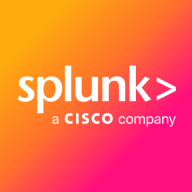

Splunk Enterprise Security and Mezmo compete in cybersecurity solutions. Splunk, with its comprehensive threat detection capabilities, often takes the lead over Mezmo's streamlined approach in environments requiring advanced features.
Features: Splunk Enterprise Security provides advanced threat detection, customizable incident response, and deep analytics tools. It is suited for large environments requiring extensive visualization options. Mezmo offers essential security features focused on intuitive operation and integration, ideal for rapid deployment and straightforward management in smaller teams.
Ease of Deployment and Customer Service: Splunk Enterprise Security's deployment is complex and may require dedicated expert teams, resulting in a time-consuming process. Mezmo is generally faster and simpler to deploy, with straightforward configuration catering to organizations with limited IT resources.
Pricing and ROI: Splunk Enterprise Security has a higher initial cost, with potential for greater long-term ROI due to its scalable capabilities. Mezmo presents a budget-friendly option with lower upfront costs, delivering solid returns through efficient performance in less resource-intensive environments.
| Product | Market Share (%) |
|---|---|
| Splunk Enterprise Security | 6.9% |
| Mezmo | 0.5% |
| Other | 92.6% |
| Company Size | Count |
|---|---|
| Small Business | 109 |
| Midsize Enterprise | 50 |
| Large Enterprise | 264 |
Today’s enterprises must manage a massive amount of machine data. They require a platform that enables engineering teams to deliberately route and store structured and unstructured data for different teams with unique use cases. Legacy platforms weren’t made for this moment.
Mezmo, formerly LogDNA, lets organizations ingest, process, route, analyze, and store all of their log data. Purpose-built for modern engineering teams—including developers, SREs, IT Operations, and Security Engineers—the Mezmo platform is trusted by thousands of companies for SaaS, cloud, and hybrid applications.
Splunk Enterprise Security delivers powerful log management, rapid searches, and intuitive dashboards, enhancing real-time analytics and security measures. Its advanced machine learning and wide system compatibility streamline threat detection and incident response across diverse IT environments.
Splunk Enterprise Security stands out in security operations with robust features like comprehensive threat intelligence and seamless data integration. Its real-time analytics and customizable queries enable proactive threat analysis and efficient incident response. Integration with multiple third-party feeds allows detailed threat correlation and streamlined data visualization. Users find the intuitive UI and broad compatibility support efficient threat detection while reducing false positives. Despite its strengths, areas such as visualization capabilities and integration processes with cloud environments need enhancement. Users face a high learning curve, and improvements in automation, AI, documentation, and training are desired to maximize its potential.
What Are the Key Features of Splunk Enterprise Security?In specific industries like finance and healthcare, Splunk Enterprise Security is instrumental for log aggregation, SIEM functionalities, and compliance monitoring. Companies leverage its capabilities for proactive threat analysis and response, ensuring comprehensive security monitoring and integration with various tools for heightened operational intelligence.
We monitor all Log Management reviews to prevent fraudulent reviews and keep review quality high. We do not post reviews by company employees or direct competitors. We validate each review for authenticity via cross-reference with LinkedIn, and personal follow-up with the reviewer when necessary.